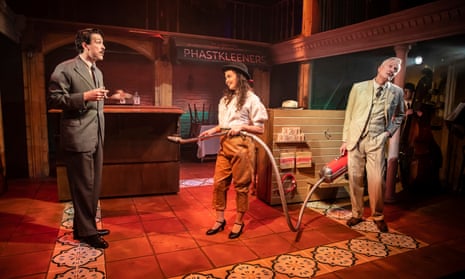Though equivocal about many aspects of religion, Graham Greene had nearly supernatural gifts of prophecy as a novelist. The Quiet American (1955) spookily previewed America’s disaster in Vietnam. Three years later, Our Man in Havana, in which an English expat vacuum cleaner salesman in Cuba sells fake secrets to MI6 for cash, was an espionage farce that turned serious with the Iraq “dodgy dossier” and other blurring of fact and fabrication. Greene’s spy fiction heir, John le Carré, so admired Our Man in Havana that he wrote an acknowledged homage in The Tailor of Panama.
In their musical version, world premiering at the picturesque and enterprising Watermill, Richard Hough (book and lyrics) and Ben Morales Frost (music), are alert to both the story’s topicalities about the unreliability of information and the chain of literary heritage. One of the strongest songs, The Perfect Spy, alluding to a Le Carré title, nicely honours two of the greatest English writers about public and private deceit.
The score is geographically two-tone – mambo and rumba rhythms for locals, such as the twice-reprised The Streets of Havana – and Noël Cowardly recitative and patter for Nigel Lister’s imperfect spy James Wormold. As Milly, the teenager whose shopping and equestrian bills lead her divorced father to trade falsehoods, Daniella Agredo Piper appropriately moves between the musical dual nationalities.
The performers deserve an ensemble award for astonishing multi-skilling. Lister accompanies on double bass or guitar the few scenes he isn’t in. Adam Keast, fast-changing between the parts of a Whitehall spymaster and a Cuban secret policeman, also finds time for string and percussion. Paula James plays two contrasting women, plus guitar and drums. On the tiny stage, Abigail Pickard Price’s neat direction somehow prevents anyone getting pranged by bow, drumstick or the quick-change bits of Kat Heath’s ingenious set, in which pianos suddenly become urinals, bookcases or cars.
As is often the case with new musicals, it feels another rigorous workshop away from becoming the absolute pleasure attainable. In the second half, the book contains too much novel: Greene’s great scene of a game of draughts with spirit miniatures as pieces is curiously spoken, not sung. But while the novel has dated in some ways – its first line of dialogue contains the n-word – this show enjoyably and intelligently distils Greene’s lasting truths about lying.
Our Man in Havana is at the Watermill theatre, Newbury, until 21 May.

Comments (…)
Sign in or create your Guardian account to join the discussion